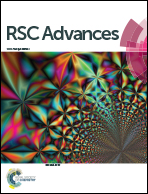Effects of spark plasma sintering conditions on the anisotropic thermoelectric properties of bismuth antimony telluride†
Abstract
Bismuth antimony telluride (BixSb2−xTe3, 0.4 < x< 0.6) is one of the best and most-used p-type semiconductor materials for near-room-temperature thermoelectric power generation. In this work, p-type Bi0.4Sb1.6Te3 samples were prepared under various conditions (temperature, holding time, and ramp-rate) using spark plasma sintering (SPS). The effects of SPS conditions on the anisotropic thermoelectric properties and microstructure evolutions were systematically investigated. The change of sintering temperature showed stronger influence than other sintering parameters to the resulting thermoelectric properties. Samples sintered over the temperature range between 653 K and 773 K showed significant differences in the degrees of orientations. The change was mainly caused by grain growth and re-orientation. Despite of the anisotropy, zT value as high as 1.2 to 1.3 was achieved over the temperature range of 300 to 360 K by directly using commercial power sintered at 723 and 773 K. The sintering profiles and microstructure evolutions during SPS were illustrated and the thermoelectric properties as a function of the degrees of orientations were shown and discussed in detail.


 Please wait while we load your content...
Please wait while we load your content...